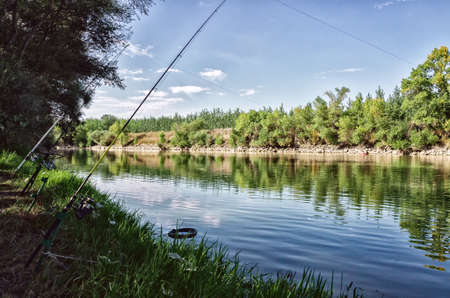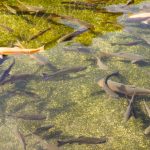The Appeal of Rural America’s Hidden Waters
There’s something special about casting a line in the quiet corners of rural America, where small towns hug winding rivers and forgotten ponds hide in the woods. Unlike the crowded banks of famous lakes or popular rivers, these off-the-grid fishing spots offer solitude and a sense of adventure you just can’t find anywhere else. Here, it’s not just about catching fish—it’s about connecting with the land, soaking up local stories, and experiencing the raw beauty that big-name destinations often lack. In these backcountry waters, you’ll find fewer boats, less pressure on fish populations, and a slower pace that invites you to truly appreciate the moment. For anglers willing to explore beyond the well-trodden paths, rural America’s secret fishing holes deliver a unique blend of challenge, peace, and authentic small-town hospitality. Whether you’re after trophy bass or just looking for a quiet spot to unwind, these hidden gems prove that sometimes the best fishing is where most folks never think to look.
Locals-Only: How to Find the Best Secret Fishing Holes
Stumbling onto a truly secret fishing spot in rural America isn’t just about luck—it’s a skill honed by tapping into local knowledge, reading the landscape, and using modern resources. Here’s how you can find those hush-hush locations where the fish are biting and the crowds are nowhere in sight.
Tap Into Local Knowledge
Start by connecting with folks who know the area best. Whether you’re at the corner diner grabbing coffee or chatting at the bait shop, locals often hold the keys to secret fishing holes. Don’t be afraid to strike up a conversation—many small-town anglers appreciate genuine curiosity and might share a tip if you show respect for their waters.
Reading the Landscape Like a Pro
Learning to read the land can lead you straight to hidden gems. Look for:
| Landscape Feature | Why It Matters |
|---|---|
| Old Bridges & Culverts | Fish gather in deeper water near structures. |
| Abandoned Farm Ponds | Often overlooked, these can be loaded with bass and panfish. |
| Remote Creek Bends | Bends create natural pools that attract fish. |
Online Forums and Digital Tools
Today’s anglers also use technology to their advantage. Check out regional Facebook groups, subreddits like r/Fishing, or platforms like Fishbrain. These communities often drop subtle hints—sometimes even GPS coordinates—about lesser-known spots. Just remember: if someone shares a location, practice good etiquette and keep it clean for the next angler.
Quick Tips for Success
- Always ask permission before entering private property.
- Carry a paper map—cell service can be spotty in remote areas.
- Keep your discoveries low-key; part of preserving these spots is respecting their secrecy.
If you put in the work—mixing old-school sleuthing with new-school tech—you’ll discover fishing holes that most folks drive right past. That’s what makes small-town secrets so rewarding for true outdoor adventurers.

3. Essential Gear for Remote Fishing Adventures
When you’re heading out to those hidden fishing holes tucked away in rural America, being prepared isn’t just smart—it’s essential. Small town secrets often mean fewer amenities, so packing the right gear can make or break your adventure. Here’s a practical rundown of what every angler should have before venturing off the beaten path.
Compact Tackle Kits
Forget hauling a bulky tackle box down a gravel road or through thick brush. Invest in a compact, organized tackle kit that fits easily in your backpack. Look for setups with adjustable compartments for lures, hooks, and sinkers, along with pliers and line cutters. Local fish often have their own quirks, so pack a mix of baits—think soft plastics and spinnerbaits—to cover your bases.
Portable Coolers
Out in the backwoods, there’s no bait shop around the corner. A lightweight, portable cooler is crucial for keeping your catch fresh until you get home—or at least back to your truck. Soft-sided coolers with shoulder straps are easy to carry and tuck into tight spots along the riverbank or lakeshore.
Survival Must-Haves
Remote spots mean you’re on your own if things go sideways. Always bring a reliable multi-tool and a first-aid kit stashed in a waterproof pouch. A headlamp or flashlight (with extra batteries), fire-starting gear, and an emergency blanket can be lifesavers if you end up staying longer than planned. Don’t forget bug spray and sunscreen—small towns don’t mean small bugs or gentle sunshine!
Navigation Tools
Cell signals fade fast in America’s rural heartland. Bring an old-school map and compass as backup, even if you’re using GPS. Mark your entry point and any notable landmarks so you never lose your way back.
Water & Snacks
Packing enough water is non-negotiable; remote streams aren’t always safe to drink from. Toss in high-protein snacks like jerky or trail mix to keep your energy up during long hours by the water.
With these essentials dialed in, you’ll be ready to chase big bites—and big stories—far from the crowds in America’s best-kept small town fishing secrets.
4. Respect and Responsibility: Fishing Etiquette in Small Towns
When you venture into rural America’s hidden fishing gems, blending in with the local community is as important as landing a trophy catch. Small towns cherish their peace, traditions, and sense of ownership over their waters. To make your adventure successful and welcome, it’s crucial to understand and practice proper fishing etiquette. Here’s how to show respect, follow unspoken rules, and handle private property with care while exploring these undiscovered spots.
Understanding Local Customs
Every small town has its own rhythm. Locals might have favorite spots, special ways of greeting, or unwritten codes about when and where to fish. Start by observing and listening—whether at the bait shop or the dock. A friendly “Good morning” goes a long way. Avoid acting like an outsider with all the answers; instead, ask for advice or recommendations on good fishing areas.
Unspoken Rules You Should Know
| Rule | Why It Matters | How to Practice |
|---|---|---|
| Keep Noise Down | Maintains tranquility for locals and wildlife | Use soft voices; avoid loud music or shouting |
| Pack Out What You Pack In | Keeps the environment pristine | Carry all trash back with you; leave no trace |
| Share the Water | Avoids conflict and builds goodwill | Don’t crowd other anglers; rotate popular spots |
| No Trespassing Means No Trespassing | Respects private landowners’ rights | Stick to public access unless given permission |
| Respect Local Limits & Seasons | Supports conservation efforts | Follow posted signs and regulations strictly |
Navigating Private Property Concerns
Many rural fishing hotspots run alongside or through private land. Always check maps or ask locals if you’re unsure about boundaries. If a spot looks promising but seems to be on someone’s property, never assume it’s okay to enter—seek explicit permission first. Many landowners are proud of their waters but expect politeness and honesty from visitors.
Tips for Approaching Landowners:
- Be Polite: Knock on the door or greet them courteously if you see them outside.
- State Your Intentions: Briefly explain why you’re there and ask if fishing is allowed.
- Offer Thanks: Whether granted access or not, always thank them for their time.
- No Means No: Respect refusals without complaint or argument.
The Takeaway: Leave a Good Impression
Your actions reflect on all visiting anglers. By respecting local customs, following unspoken rules, and handling private property with care, you’ll help ensure that these small-town secrets stay open to responsible outsiders—and maybe even get invited back for another round next season.
5. Top Secret Spots: Stories and Suggestions from Real Anglers
If you ask any seasoned angler, the best fishing stories rarely come from famous lakes or crowded rivers—they come from the backroads and byways of rural America. Here’s a roundup of insider tales and tried-and-true tips, straight from the locals who know these waters best.
Hidden Gems Passed Down Through Generations
Many small towns have fishing holes that are practically family heirlooms. In places like Driftwood, Tennessee, old-timers swear by a bend in the creek behind Miller’s Barn—just follow the cottonwoods and you’ll find bass lurking where city folk never look. Locals often mention that patience is key: “It’s not just about casting your line, it’s about reading the water and waiting for the right moment.”
The Bait Shop Whisper Network
Don’t underestimate the power of a friendly chat at the town bait shop. In New Harmony, Indiana, anglers say the best catfish spot is a gravel pit three miles out of town—information only shared if you show some respect and buy local worms. Many small-town bait shops double as unofficial information hubs, so keep your ears open for those offhand suggestions.
Lesser-Known Rivers and Forgotten Ponds
Sometimes, overlooked streams and ponds yield the biggest surprises. Near Appleton, Wisconsin, a forgotten farm pond behind an abandoned silo is legendary for its oversized bluegill. According to local legend, “If you can find it after sundown, you’ll have all the peace—and fish—you could want.”
Tips for Finding Your Own Secret Spot
Real anglers recommend exploring unmarked trails, talking to locals at diners, and respecting private land boundaries (always ask permission). Use satellite maps to spot hidden waterways or search for historic mill sites—these often turn up untouched fishing goldmines. And remember: locals cherish their secrets, so if you’re lucky enough to be let in on one, pay it forward with care and gratitude.
From whispered tips at dusty general stores to unforgettable evenings on a silent dock, America’s rural fishing spots are more than locations—they’re living stories. Next time you travel off the beaten path, keep your eyes peeled and your ear to the ground; your next great fishing adventure might just be waiting in a place only the locals know.
6. When to Visit: Timing, Seasons, and How to Blend In
Timing Your Trip for the Best Fishing
If you want to get the most out of your small-town fishing adventure, timing is everything. Spring and early summer are prime times across much of rural America—waters are warming up, fish are hungry after winter, and crowds are still thin before peak vacation season hits. In the fall, cooler temperatures mean fewer people but plenty of active fish stocking up before winter. Avoid holidays and big local events when these towns fill up with visitors, making your secret spot not-so-secret.
Reading the Local Calendar
Every small town has its own rhythm. Check local event calendars for county fairs, fishing tournaments, or hunting seasons that can draw crowds or even restrict access. Midweek visits usually offer more solitude than weekends. If you’re flexible, ask a local bait shop or diner owner when the best “quiet” times are—they’ll know when things slow down.
Blending in Like a Local
The quickest way to blow your cover as an outsider? Acting like one. Dress for the region: simple outdoor gear, nothing too flashy or brand-new. Keep your conversations friendly but respectful—locals appreciate a “good morning,” but don’t pry into their favorite fishing holes unless they open up first. Buy supplies locally and eat at the mom-and-pop diners; it shows you value the community.
Low Profile Is Key
When you find that hidden fishing gem, keep it quiet. Don’t post exact locations online or tag them on social media—word spreads fast in tight-knit communities. And always follow local regulations and etiquette: pack out your trash, respect private property lines, and consider inviting a local along if you make a friend. The best way to get invited back is to leave nothing behind but a good impression.


